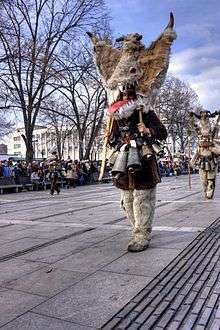Kukeri



Kukeri (Bulgarian: кукери; singular: kuker, кукер) are elaborately costumed Bulgarian men who perform traditional rituals intended to scare away evil spirits. Closely related traditions are found throughout the Balkans and Greece (including Romania and the Pontus). The costumes cover most of the body and include decorated wooden masks of animals (sometimes double-faced) and large bells attached to the belt. Around New Year and before Lent, the kukeri walk and dance through villages to scare away evil spirits with their costumes and the sound of their bells. They are also believed to provide a good harvest, health, and happiness to the village during the year.
The kukeri traditionally visit peoples' houses at night so that "the sun would not catch them on the road." After parading around the village they usually gather at the village square to dance wildly and amuse the people. Kukeri rituals vary by region but remain largely the same in essence.
Distribution
The custom is generally thought to be related to the Thracian Dionysos cult in the wider area of Thracia. Similar rituals can be also found in much of the Balkans.[1] The name kuker has been derived from Latin cuculla meaning "hood, cowl" or cucurum, "quiver" (i.e. in the sense of a container; an abbreviation of koukouros geros).[2]
The corresponding figure in Greek-speaking Thrace is known as Kalogeros "rod-carrier", also shortened to cuci, in former Yugoslavia known as didi, didici, in Bulgaria as kuker or babushar, as momogeros in Pontic Anatolia. In Romania, this figure mostly appears together with a goat, known as capra, turca or brezaia.[3]
Kuker
Kuker is a divinity personifying fecundity, sometimes in Bulgaria and Serbia it is a plural divinity. In Bulgaria, a ritual spectacle of spring (a sort of carnival) takes place after a scenario of folk theatre, in which Kuker's role is interpreted by a man attired in a sheep- or goat-pelt, wearing a horned mask and girded with a large wooden phallus. During the ritual, various physiological acts are interpreted, including the sexual act, as a symbol of the god's sacred marriage, while the symbolical wife, appearing pregnant, mimes the pains of giving birth. This ritual inaugurates the labours of the fields (ploughing, sowing) and is carried out with the participation of numerous allegorical personages, among which is the Emperor and his entourage.[1]
Capra
Capra (goat) is a Romanian New Year dance that dates back to 1,600 BC. In Greek mythology, bacchantes would don the skins of sacrificed goat. For Romanians, the death and resurrection of the Capra reflects the death and rebirth of vegetation. Capra's chiseled wooden mask has a movable 'clamping' lower jaw and its horns are either of wood or from a goat, ram, or stag. The horns are adorned with girls' beads and kerchiefs, ribbons, multi-colored tassels, mirrors, ivy (plant considered sacred to Dionysus, used in thyrsus staves), basil (a symbol of love in Italy and Romania), natural or artificial flowers etc. Depending on the local tradition, Capra's body may be made of either carpet or red cloth with various adornments sewn on: traditional colorful cloth, embroidered handkerchiefs in Suceava, beaded ornate women's textile girdles in Bacău, reed seed heads in Botoşani and Iaşi, goat pelts in Vrancea and in Mehedinţi, fabric ribbons or colored paper in Neamţ and in Giurgiu etc.
Kukeri in medias
Kukeri are featured in "Fish on" video from Lindemann (band) and in the movie Toni Erdmann from Maren Ade
See also
- Acta Dasii
- Phallic processions
- Kourbania
- the Kukeri Nunataks, rock formations on Livingston Island in the South Shetland Islands, Antarctica are named after the Bulgarian Kukeri.
References
| Wikimedia Commons has media related to Kukeri. |
- 1 2 Kernbach, Victor (1989). Dicţionar de Mitologie Generală. Bucureşti: Editura Ştiinţifică şi Enciclopedică. ISBN 973-29-0030-X.
- ↑ W. Puchner, Studien zur Volkskunde Südosteuropas und des mediterranen Raums, 2009, p. 180 fn. 32.
- ↑ W. Puchner, Studien zur Volkskunde Südosteuropas und des mediterranen Raums, 2009, p. 276.
External links
- "Startsi-Kukeri-Mummers of Karlovo Region, Bulgaria". Kukeri Foundation. Retrieved 2011-10-23.
- http://kukeriwines.com/
- http://www.surva-bg.com/
- http://www.kukerlandia.com/en/